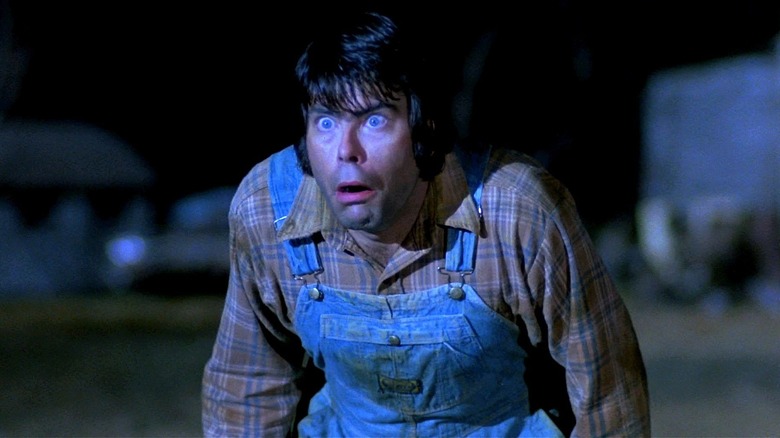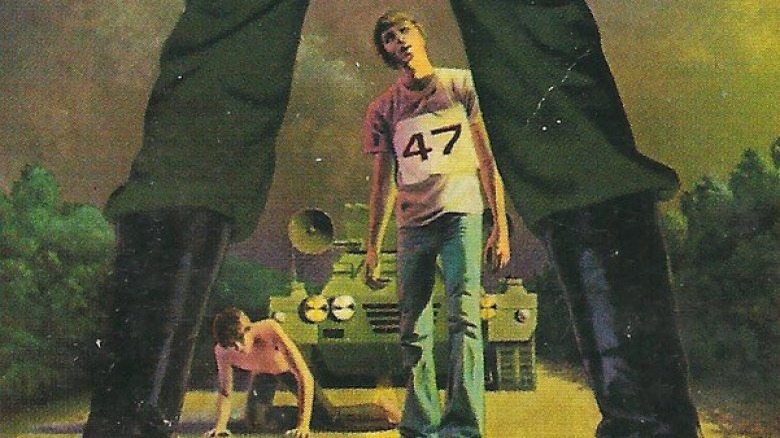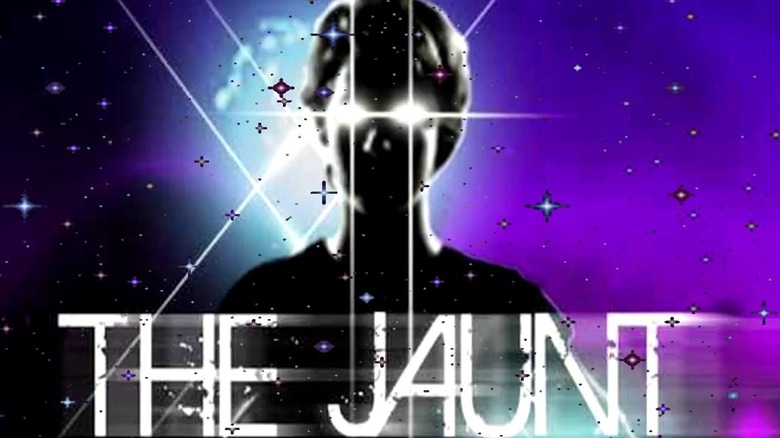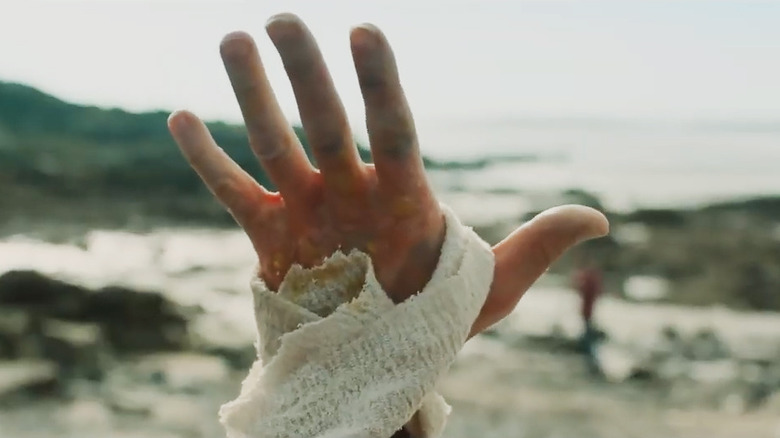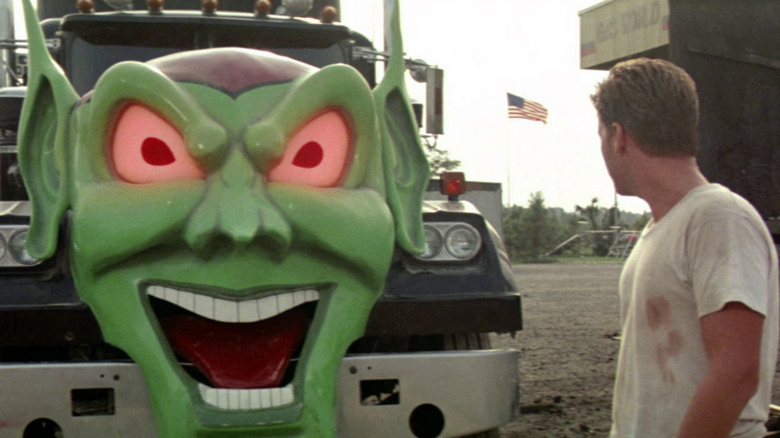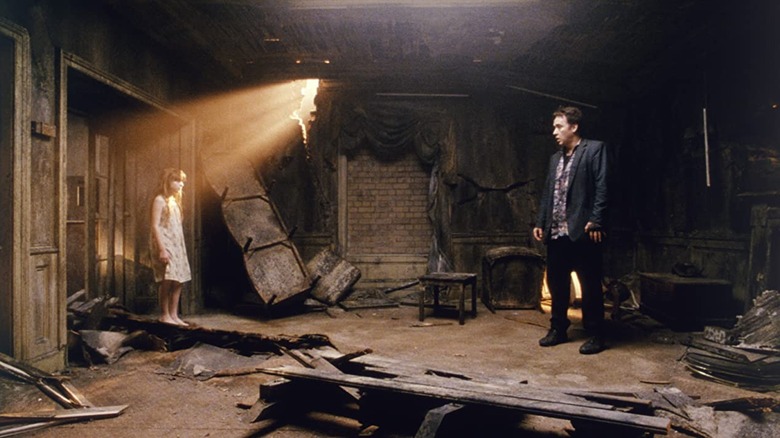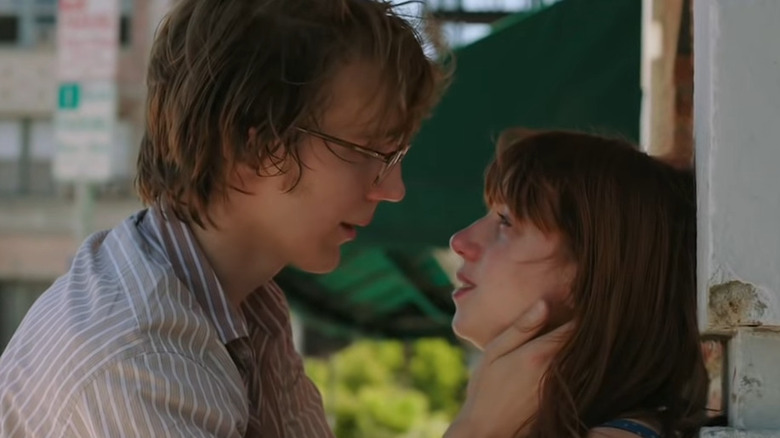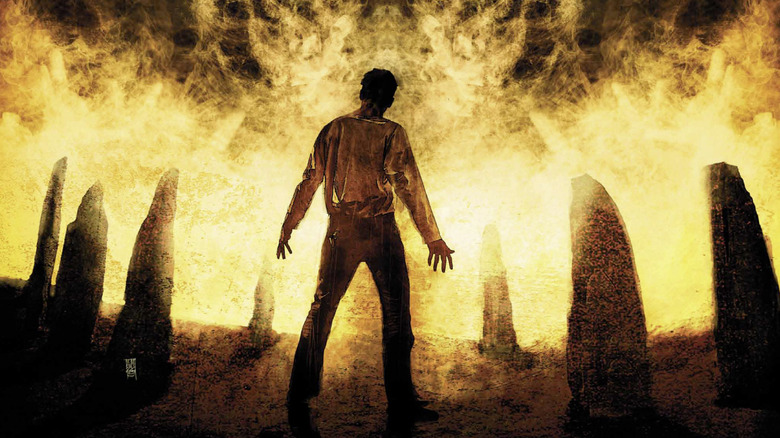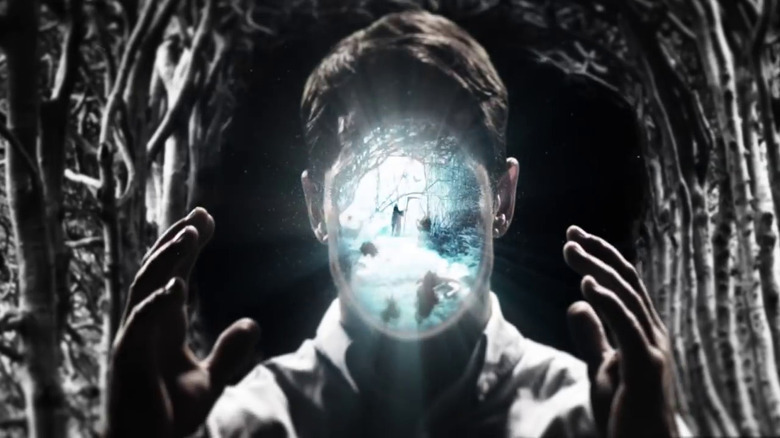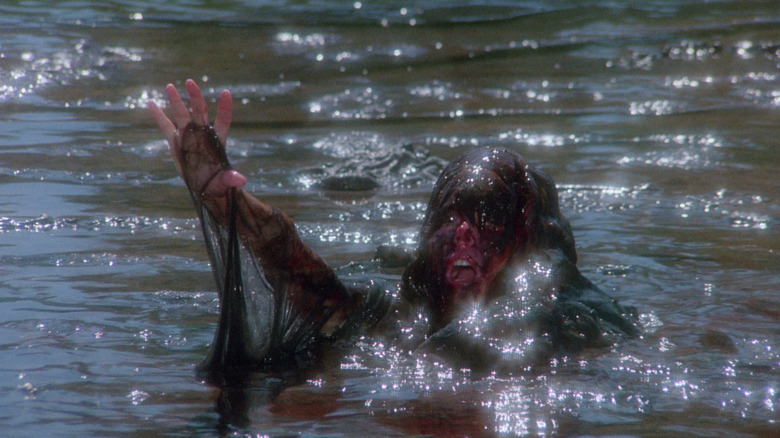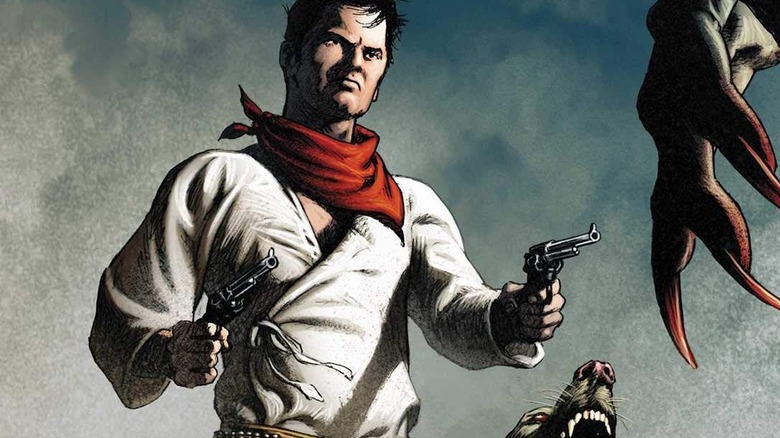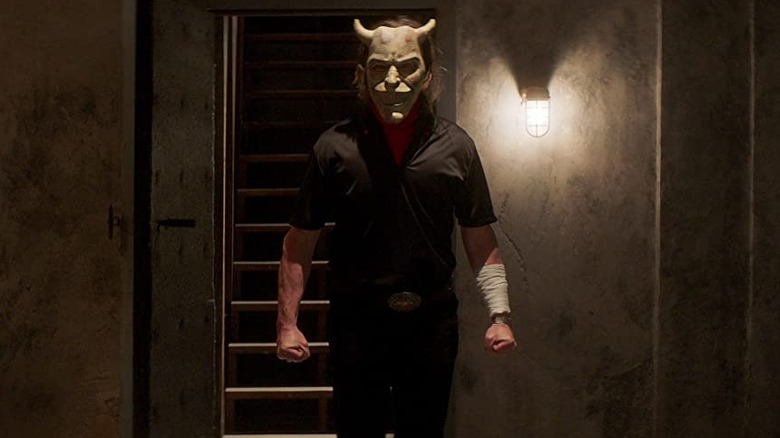12 Stephen King Short Fiction Works That Should Be Movies
If you love Stephen King as much as you love movies, there's plenty to choose from for a spooky evening in front of the screen. Sure, the batting average on quality of adaptation isn't entirely in King's favor. But the high points — like "Carrie," "The Shawshank Redemption," or "The Shining" — are some of the most vivid and memorable cinematic experiences you'll ever have.
As of 2022, there are nearly 50 feature films based on King's fiction (albeit, some of those truly stretch the definition of "adaptation.") Even then, there's still a colossal amount of brilliant work still yet to make the leap from page to screen. And to be frank, some of those adaptations deserve another shot. From short stories under 10 pages to a novel that's a third of the length of tomes like "The Stand" or "It," we've put together a selection of short(er) fiction works that we think hold the potential to be the next great Stephen King adaptations.
The Long Walk
The first novel Stephen King ever wrote is among his bleakest and most effective. You might think we're talking about "Carrie," but as King notes in his introduction to "The Bachman Books," his dystopian novel "The Long Walk" was actually written when he was a college freshman. While it's not a short story, we're cheekily stretching the boundaries of short fiction a little here for King's sake, since it's short by his usual standards.
"The Long Walk" envisions a near-future United States under totalitarian rule, where a brutal marathon entertains the masses each year. Teenager Ray Garraty and 99 fellow Walkers embark on a last-man-standing journey through the heart of America, driven by promises of fortune and fame. It's an emotionally exhausting, harrowing work of fiction that feels planted in reality, even 40 years later. What makes it ripe material for adaptation is its rich cast of characters — each with their own unique background and reasons for enlisting in the deadly walk — and its evergreen themes of public spectacle and the ever-hungry political machine.
Frank Darabont, the writer-director behind acclaimed King adaptations including "The Shawshank Redemption" and "The Mist," had a movie of "The Long Walk" in the works for quite a few years. Unfortunately, those plans never came to fruition. "Scary Stories to Tell in the Dark" director André Øvredal is currently set to tackle the novel for New Line Cinema, and we hope they manage to do the novel's angry, relentless spirit justice.
The Jaunt
After so many years as a writer, Stephen King has dabbled in just about every genre there is. But when it comes to classic science fiction, with emphasis on the science part, there's a limited selection of stories under his belt. If we had to choose a single one to see on the big screen, it would have to be the sci-fi nightmare of "The Jaunt."
Playing out like a horror riff on "Star Trek," "The Jaunt" takes place in the 24th century. Mark Oates awaits his family's turn to be "Jaunted" to Mars, a process that instantly teleports matter between portals. As Mark explains the technology to his curious children, we learn about its invention back in the 20th century — and most importantly, why Jaunt passengers must be anesthetized before passing through. King laces the historical account with the seeds of cosmic horror, culminating in one of his most disturbing and unforgettable endings to date: Oates' young son emerging from the Jaunt, driven mad and freakish by an eternity of consciousness outside of space and time. "I saw! I saw! Longer than you think!"
What makes this story so spectacular and fit for adaptation as a movie is its gradual worldbuilding, drawing you in with a double-layered narrative of scientific ingenuity while dread steadily grows around the edges like rot. There's not nearly enough sci-fi horror in the world of cinema, and if there was a name that could make that happen, it's King.
I Am the Doorway
While we're on the subject of Stephen King's flirtation with science fiction, "I Am the Doorway" is another chilling exploration of the cosmic unknown that deserves a shot on the big screen. This Cronenbergian tale of an astronaut who unwittingly brings alien life back home in his body is a perfect candidate for cinematic thrills.
In the near future, humanity's continued efforts at making contact with intelligent life have come up short. After a disastrous manned voyage to Venus (which left him paraplegic and the space program defunded), ex-astronaut Arthur discovers the mission was more successful than believed. His body begins to change: eyes emerge from the flesh of his hands, and the cosmic forces they belong to begin to control his body. Before long, they start to kill, and he has no choice but to cut off the "doorway" between worlds by setting his own hands ablaze. It works, until seven years later, rumors of a new space program begin to stir, and "a ring of 12 golden eyes" emerges from Arthur's chest.
"I Am the Doorway" plays with themes of hubris and Eldritch body horror imagery in ways that simply beg for a feature adaptation. There's plenty of set-up for gnarly special effects and a slow-burning pace that could truly get under the skin of cinema audiences. 2017's "Life" was an okay sci-fi horror flick, but King's story brings the terror home in far more unsettling ways.
Trucks
"Trucks," taken from Stephen King's short story collection "Night Shift," has actually been adapted to the big screen twice. But considering those films range from forgettable (1997's TV movie "Trucks") to downright laughable ("Maximum Overdrive," directed and criticized by King himself), we think it's time somebody tested out the theory of third times a charm. The story imagines the world's trucks gaining sentience and becoming hostile to their creators, trapping a group of survivors in a roadside truck stop. On the surface, it sounds a little goofy, but King pulls it off by focusing the narrative on a single location (a benefit for a movie adaptation) and with his depiction of the antagonists as not just vehicles but malevolent, snarling machinery.
As the survivors struggle to comprehend their predicament, they're picked off one-by-one by the intelligent mechanical predators. Although there's a glimmer of hope when the trucks signal their need for fuel, the narrator ultimately concludes that humanity's desire to survive will leave them with no choice but to refuel, repair, and replenish their new masters. It's a solid, surreal premise for a movie that needs a director who can translate the story's nihilistic tone for the visual medium, and make the audience believe that our everyday transport could be a plausibly terrifying threat. That's not an easy job, but "Trucks" remains one of King's most strange and haunting stories that could be a brilliant work of dark satire in the right hands.
Everything's Eventual
Stephen King's collection "Everything's Eventual" has birthed several film adaptations since its release in 2002, such as "Riding the Bullet" by frequent King collaborator Mick Garris, and the excellent haunted hotel thriller "1408." We reckon the titular story should get some love, too. It might not have the monsters or big scares of King's most famous blockbusters, but it's full of mystery and strange powers that would be killer on film.
Richard "Dinky" Earnshaw is an isolated young man with the ability to influence the thoughts and actions of others by drawing complex patterns of sigils. He catches the attention of a mysterious corporation and is recruited by Mr. Sharpton, who provides Dink with whatever he needs in exchange for the occasional targeted use of his psychic abilities. As Dink begins to question the true purpose of Sharpton's project, he discovers that he's not only one of many psychics working for TransCorp, but he's also been causing the deaths of innocent public figures.
King unfolds the conspiracy from the aloof perspective of Dink, and a film adaptation could use that drip-feed narrative pacing to craft a strange and compelling journey to the horrible truth. We'd love to see the morbid and creative ways Dink's power can be manifested visually, and a talented screenwriter could take advantage of the story's socially relevant commentary on how corporations distance and disconnect employees from the end result of their labor to terrible effect.
I Know What You Need
It might seem strange for a Stephen King story to be originally published in Cosmopolitan of all places. But once you've read "I Know What You Need," a twisted tale of college romance mired in the occult, it makes a lot of sense. This is an eerie, romantic thriller we'd love to see get the movie treatment.
Elizabeth, a college student, is lost in thoughts of upcoming finals and whether she really wants a future with her boyfriend Tony. Suddenly, a new man enters her life. Edward is awkward, disheveled, and a bit strange, but he has the uncanny knack to know exactly what Liz desires. She's curious and maybe even a little infatuated with Ed, but her roommate grows concerned. After digging into Ed's murky past, we learn that he's not just an observant suitor: he's using black magic to work his way into Liz's heart.
While some King stories work best as brief visions of written horror, we think "I Know What You Need" has a narrative that would translate well to the screen. It plays effectively on anxieties around dating (especially in the age of Tinder) and would only benefit from more time to develop the dynamics between Liz and Ed before things get truly dark. And while we're here, wouldn't Paul Dano would make a perfect Ed?
N.
Inspired by Arthur Machen's classic story "The Great God Pan," but told as only Stephen King himself could, "N." is a story-within-a-story novella that concerns a mysterious rock formation in the town of Ackerman's Field. Already adapted as a graphic novel by Marvel and a multi-part animated video series, "N." deserves to take the next step into cinematic territory.
There are a few narrative threads going on in "N.", but the main one follows a psychiatrist whose patient is convinced that a nearby circle of stones is a gateway between worlds. The patient, referred to as N., claims he's burdened with ensuring that the gateway remains closed by constantly observing the stone circle and making sure it never changes. The psychiatrist writes the story off as typical obsessive-compulsive symptoms, but when N.'s claims begin to check out, the psychiatrist becomes entangled in the conspiracy himself. By the very nature of its nested narrative, "N." provides the framework for a slow-burning, atmospheric, and head-spinning horror movie exploring the power of urban legend, the function of rituals, and the limits of science.
Ur
If you haven't read or even heard of Stephen King's novella "Ur," there's a good reason why: it was a Kindle exclusive for quite a few years before a heavily revised version appeared in his 2015 collection "The Bazaar of Bad Dreams." We recommend you give it a spin if you haven't already, because this weird and wonderful take on the multiverse theory could be shaped into an awesome film.
"Ur" concerns a college English lecturer who begrudgingly orders a regular Kindle, only to receive one capable of tapping into the libraries of other dimensions. He begins to find novels and plays by some of our greatest artists that simply don't exist — at least, not in our reality. The new gizmo is a fun novelty at first, but when he discovers the option to read headlines ripped from his future, he's given the opportunity to direct the very current of fate. It's a wacky, clever premise with a few connections to King's "Dark Tower" series as an added bonus.
So how do you turn that rather literary story into an entertaining cinematic experience? Well, if we switch the Kindle for a tablet, what if it could also access films and television that don't exist in our dimension? How about TV news broadcasts instead of just newspaper headlines? King's original premise leaves the door open for plenty of inventive and entertaining approaches to adaptation, and we'd love to see how wild Hollywood could get with it.
The Raft
We wouldn't dare try to erase the gruesome fun of "The Raft," a segment of 1987's "Creepshow 2" that's not only the strongest of the movie's three stories, but is also adapted from a story boasting one of Stephen King's most low-key horrifying creatures. However, we also think it deserves a chance to become more than just the best segment in a ho-hum anthology horror sequel.
One of the many bone-chilling stories in King's 1985 collection "Skeleton Crew," "The Raft" concerns a group of teens who head to a remote lake for a summer afternoon of swimming and maybe even a little hanky-panky. But they're soon attacked by a bizarre, sentient sludge floating on the lake's surface, with only a rickety wooden raft between it and its prey. One by one, the terrified teens are consumed by the entity, adding to its impossible mass.
The creature, first described as a "black patch on the water" similar to an oil slick, is fast, endlessly patient, and has a hypnotic effect on the teens. We never learn what it really is or how it came to call the lake home, and that's what makes it so damn creepy as a movie monster. The otherworldly nature of the thing in the lake and the psychological terror its mere presence inflicts on the teens convince us this story deserves a feature-length take with the slimiest special effects Hollywood has to offer.
Beachworld
One of Stephen King's underrated gems is the science fiction shipwreck tale "Beachworld." It almost feels like something you'd find in an anthology of stories inspired by "Star Wars." There's a desert planet, androids, and alien cultures clashing with our own. And that's why we think "Beachworld" would be a unique entry in the great King Cinematic Universe.
The story kicks off with the crash-landing of a human spacecraft, approximately eight centuries into the future. FedShip ASN/29 has suffered catastrophic systems failures, stranding its occupants to the surface on a nearby planet. Surviving astronauts Shapiro and Rand emerge from the wreck to discover the entire planet is sand as far as the eye can see, and their only hope of rescue is the ship's emergency beacon. Shapiro becomes concerned with Rand's obsession with the sand (which seems to have a mind of its own), and when a merchant ship lands to negotiate rescue, Beachworld itself reaches out to keep its new visitors.
We live in a time where we not only got a fantastic "Dune" adaptation from Hollywood, but one that did well enough at the box office to ensure a follow-up. Maybe that opens the door for an expansion of "Beachworld;" not a grand space opera, but a more focused and strange horror film playing on survival, distrust, and the cosmic unknown. We're up for it as long as it keeps King's original, surreal ending, which we'll leave you to enjoy for yourself.
The Little Sisters of Eluria
Hollywood's flirtation with Stephen King's "The Dark Tower" series has been an unusual form of torture for fans of the novels. Many creative minds have tried over the decades, with numerous film and television series adaptations falling through the cracks into production hell, along with a notable misfire in 2017. If taking on the entire grand saga is too monumental a task, we think Hollywood should try adapting the prequel story "The Little Sisters of Eluria."
In a story set years before "The Gunslinger," a young Roland Deschain approaches the town of Eluria and is attacked by "slow mutants," human beings warped by the nuclear energy of ancient technology. They bring him to Eluria's hospital, where he's held captive by the Little Sisters, a coven of vampires posing as nurses, who slowly feed upon their patients. With the help of a rebel among their numbers, Roland must find a way to escape the clutches of the Little Sisters and destroy them for good.
It's an eerie combination of "Salem's Lot" and the world-building of "The Dark Tower" series. As a movie, it could be a smart way to dip Hollywood's toes into that world without going all-in on the grander, blockbuster stories of the novels. We'd love to see big-screen depictions of the slow mutants, the Little Sisters, and Roland himself in a tighter narrative that isn't trying to cram eight novels' worth of lore into a single film.
Popsy
In 2006, TNT put together an anthology television series, "Nightmares & Dreamscapes," based on Stephen King's short fiction. Quite a few of those episodes were taken from the short story collection of the same name. But a notable one that didn't make the cut was "Popsy," in which a child kidnapping takes an even darker turn in classic King style.
"Popsy" follows Sheridan, a compulsive gambler whose debts have put him under the heel of crime lord Mr. Wizard. Sheridan pays off his substantial poker losses by scooping up children in his van to be trafficked by his boss. Although he never feels good about the work, there's something especially unsettling about his latest captive. The kid is pale, his teeth look unusually sharp, and the way he describes his "Popsy" gives Sheridan chills. The story concludes with the fabled Popsy landing on top of the moving van, shearing off the driver's door, and feeding the delighted boy from Sheridan's gushing throat.
In just eight brisk pages, King lays down a compelling and creepy premise for what could be developed into a deeper narrative of justice against those preying on the most vulnerable. And, of course, we'd love to see exactly what Popsy looks like in his winged, fanged glory. Obviously, horror involving kids is always a delicate subject, but King's own son Joe Hill proved it can be done effectively with the big-screen adaptation of his short story "The Black Phone."
